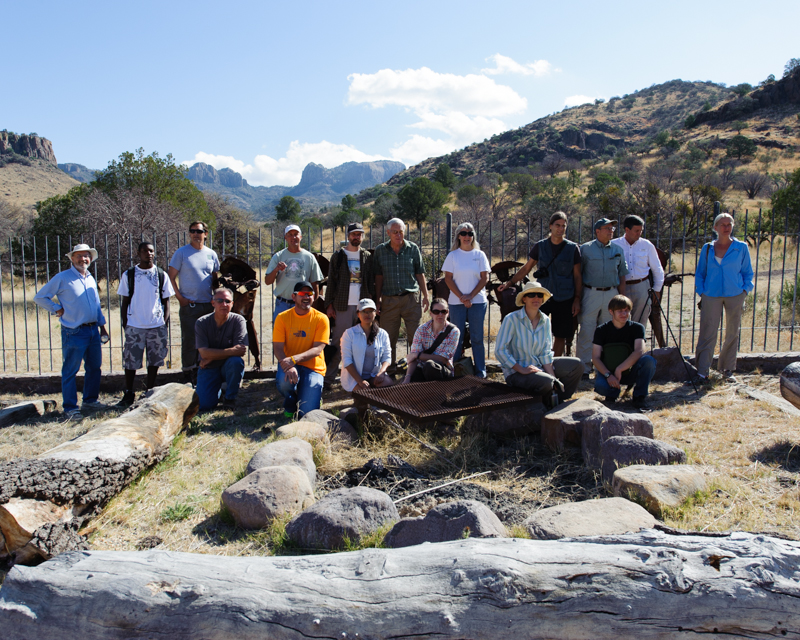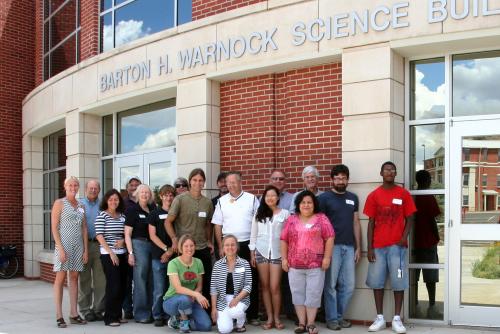
by Deb Paul, Joanna McCaffrey, Kevin Love
Texas Oklahoma Regional Consortium of Herbaria, aka TORCH held its annual meeting in Alpine, Texas hosted by Sul Ross State University. TORCH invited iDigBio to present a one-day Digitization Workshop. Workshop organizers included Amanda Neill (BRIT), Wayne Elisens (OKL), along with Deborah Paul, Joanna McCaffrey, and Kevin Love from iDigBio.
TORCH 2014 iDigBio Digitzation Workshop Announcement
TORCH 2014 iDigBio Digitization Workshop Wiki
Read more about TORCH 2014 from the ETNHC
Photos from TORCH 2014 from the ETNHC
iDigBio at TORCH 2014 Photos on Facebook
Bibliography: TORCH Presentations
TORCH Workshop Recordings
Highlights of the TORCH meeting.
On Friday, TORCH members were treated to a collecting trip on rarely seen private property, Livermore Ranch (http://livermoreranchtx.com/), hiking high into the Davis Mountains.

The Friday night mixer included a lecture from Cullen Hanks from the Texas Parks and Wildlife Department, the Texas Natural Diversity Database (TXNDD) and iNaturalist, who is looking for innovative ways to continue connecting citizens to science and linking some data and observations unique to Texas into the iNaturalist platform (http://www.inaturalist.org). 25 Workshop Attendees (TORCH members and iDigBio staff) spent all day Saturday May 25th in the Warnock Science Center immersed in a Digitization Workshop designed to introduce them to iDigBio and engage them in opportunities in the ADBC community. We were pleased to have a diverse crowd: collection managers, curators, informatics staff, and four students! Amanda Neill kicked off the meeting and we began with an informal poll asking “Where are you on the digitization scale?”
| A. | Not yet | 8* | *Many people said they are in between these categories, and often distinguished between where they were in imaging vs. where they were in databasing. Most of the category A folks stated they were looking into different ideas for getting started. |
| B. | Working on it | 10 | |
| C. | Done! | 1 | |
| D. | No idea | 1 |
Following Deb’s introduction to ADBC, iDigBio and the TCNs, and overview of iDigBio resources, seven participants provided short talks on various topics:
| Augmenting Optical Character Recognition (aOCR) WG | Jason Best (BRIT) |
| Herbarium Digitization Activities in Oklahoma | Wayne Elisens (OKL) |
| The Macrofungi Collections Consortium (by Clark Ovrebo (UCOK) and presented by W. Elisens | D. Shannon Ascensio (NY) |
| The East Texas Natural History Museum | Will Godwin (ETNH) |
| Modernization and Digitization of the Angelo State Natural History Collections (ASNHC) | Marcia Revelez (SAT) |
| ScioQualis | Joselyn Fenstermacher (SRSC) |
| Pineywoods Plants Digital Gallery | James Van Kley (ASTC) |
The schedule allowed for lots of discussion both formal and informal. Some topics of interest included a nuanced discussion of sensitive locality data, issues for digitization of specimens collected on protected land (in the past) that were not accessioned properly, PEN opportunities, copyright (data? no; images? yes), is it okay to share data with more than one portal?, and how different TORCH members might accomplish digitization as partners (equipment sharing), and the potential for sharing Global Plants (JSTOR types project) scanning equipment, …
At this point in the workshop, organizers were curious as to the TORCH members’ perceptions of just “What is iDigBio?” To find out, we asked each participants to write two or three sentences describing iDigBio. A sample of the responses:
- iDigBio is help.
- Seeking to be a vehicle for standardizing a diverse galaxy of digitizing efforts & protocols.
- iDigBio is an organization that provides information and offer resources to scientists that are developing databases for natural history collections.
- A place you obtain help & knowledge to start and until complete your herbarium digitization project – a great resource.
- National center for coordinating and supporting national history collection digitization efforts and to act as a centralized portal.
- A resource to facilitate a national effort to digitize natural history collections.
- The go-to place to find resources and networks you need to manage the digitization of your collections.
- Data quality, imaging, georeferencing and more!
- iDigBio appears to be a facilitator of the NSF’s intention to support digitization of biological collections.

Next, Joanna McCaffrey covered options for photography equipment, imaging standards, and set up with Jason and Tiana presenting some specific examples and experiences from BRIT. The idea was discussed that there is equipment at BRIT available - but those wishing to use it would need to send staff to BRIT to use it. At this point, we discussed the Small Collections Network (SCNet), "a collaborative resource for small collections and the professionals who manage them," and how TORCH members can find digitization help and opportunities there.
After introducing everyone to just what Data Standards are with respect to sharing data, Joanna covered the question: How do you get data to iDigBio? Deb followed up with how you get data out of a database (with identifiers) for sharing with the outside world.
Our afternoon discussion session covered many topics like: bar codes, what database to use (and why), as Joanna pointed out, you want to maximize the effect of friends & neighbors who are using the same system as you, sensitive locality data, objects collected on restricted land, student involvement, funding sources including foundations, SPNHC travel support for students, public participation in digitization (including a NotesFromNature.org demo),…
We packed a lot into one day! Sadly, we had to stop. iDigBio looks forward to importing data from the unique collections of TORCH and to engaging the TORCH community in this massive (essentially world-wide) effort to mobilize quality data for research.








